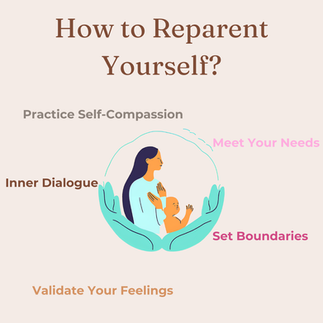At some point in life, many of us recognize a deep longing for something we missed in our formative years. Perhaps it’s unconditional love, emotional validation, or a sense of safety and structure. Reparenting yourself is the transformative process of meeting those unmet needs, healing your inner child, and creating the care and guidance you may have lacked growing up. This practice is an empowering journey toward self-compassion, emotional healing, and growth.
What Does Reparenting Yourself Mean?
Reparenting is the act of stepping into the role of a loving, attentive parent for yourself. It involves providing the emotional support, care, and boundaries you needed in childhood but may not have received. This doesn’t mean blaming your caregivers, rather, it’s about taking responsibility for your healing as an adult.
By reparenting, you nurture your inner child, the part of you that holds the memories, emotions, and experiences of your younger self. This process can help address wounds from childhood, foster emotional resilience, and improve your relationship with yourself and others.
Signs You May Need Reparenting
Reparenting can benefit anyone, but it’s particularly powerful if you notice:
Feeling overly critical of yourself.
Struggling with self-worth or feeling unlovable.
Difficulty setting boundaries or practicing self-care.
Seeking constant validation from others.
Experiencing emotional triggers or patterns that seem rooted in the past.
These are often signs of unmet needs from childhood. By reparenting, you can begin to fill these gaps with kindness and care.
Steps to Reparent Yourself
Practice Self-CompassionTreat yourself with the same gentleness and understanding you would offer a child. Replace self-criticism with affirmations like, “I’m doing my best,” or, “I am worthy of love.”
Meet Your Basic NeedsEstablish routines that prioritize your well-being. Eat nutritious meals, get enough sleep, and create time for rest and joy. These small acts of care are foundational to feeling supported.
Validate Your EmotionsAllow yourself to feel without judgment. If you’re sad, anxious, or angry, take a moment to acknowledge it: “It’s okay to feel this way.” Validation helps to process emotions instead of suppressing them.
Set Healthy BoundariesLearn to protect your energy by saying no to things that overwhelm you or don’t serve your well-being. Boundaries create safety and empower you to focus on what matters most.
Inner Dialogue with Your Younger SelfImagine speaking to your inner child. What would they need to hear? What reassurances or support would comfort them? Visualizing this connection can help you identify and address emotional wounds.
Why Reparenting is Worth It
Reparenting is not an overnight transformation, it’s a journey of small, intentional steps. But its rewards are profound:
Healing Emotional Wounds: You can resolve past hurts and build resilience.
Healthier Relationships: Reparenting helps break cycles of dependency or unhealthy patterns.
Greater Self-Awareness: By connecting with your inner child, you gain insights into your behaviors and triggers.
Empowerment: You create a narrative of strength, self-love, and growth.
Reparenting yourself is a powerful act of self-love. It’s a commitment to healing, growing, and showing up for yourself in ways you may have longed for as a child. By embracing this process, you not only nurture your inner child but also create a more compassionate and fulfilling life.
At The Mind Practice, we believe in empowering individuals to heal and thrive. If you’re on a journey of self-discovery and growth, we’re here to guide you every step of the way.
Visit www.themindpractice.in for more such articles.











Comments